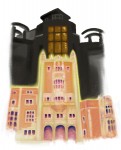To any student who pays attention to campus politics, the name John Joanino is probably a familiar one.
Joanino ended his term as undergraduate student government president last month, rounding out a year as the school’s most prominent student official.
The names Joel Ontiveros, Precious Elam, Adam Swart and Jordan Wong are likely less familiar. But the four undergraduate members of the Associated Students UCLA Board of Directors rival the student government president in their importance to student life.
The Board of Directors is a sort of shadow government, a student-majority council that heads up an organization ostensibly dedicated to serving the needs of both undergraduate and graduate students. Much less prominent than the Undergraduate Students Association Council, the board nonetheless controls an income that far outmatches that of the student government.
Where ASUCLA wields a surplus of money and influence, it suffers from an attention deficit – it consistently fails to engage the interest of students in the same way USAC does.
Let’s put it this way. If USAC was a television station, it would be CNN: important, civic-minded news mixed in with coverage of human interest stories and political horse races. ASUCLA would be C-SPAN: less interesting, to be sure, but likely showing something more newsworthy than the almost three-month anniversary of the missing Malaysian Airlines flight.
For one, members of the ASUCLA board aren’t elected, but rather appointed. So important and influential though they are, ASUCLA student representatives don’t have a party machine or networks of student voters behind them to sing their praises and put their names in Facebook statuses.
Nor is the Daily Bruin innocent in the skewed focus of campus politics. Whereas ASUCLA is dominated by budget-making and profit-forecasting, USAC provides human drama, personality and even intrigue. Intrigue is great headline material, budgets less so.
And in fact, the historical trend has been to make ASUCLA less rather than more controversial, drawing down the politics to insulate the business. Beginning in 1995, amid a serious financial crisis for the organization, student government officers were barred from sitting on the board to allow it to make business decisions outside of the push and pull of electoral politics.
But having elected officials on the board is just one possible way to ensure student participation. What needs to happen is a paradigm shift in the way students look at the organization.
For one, students can use USAC to shine an institutional spotlight on ASUCLA. ASUCLA acts as a parent organization for USAC, but as an elected body and the official voice of the student body, USAC has some claim to babysit its parent.
During the last council term, USAC General Representative Sunny Singh made it one of his goals to increase student involvement in ASUCLA, forming a contest for students to contribute designs for a new T-shirt to be sold in the student store. But student participation has to amount to more than a T-shirt contest.
For instance, students should look to take part in solving the many and serious challenges the association faces. To begin with, falling textbook revenue and rising utilities costs squeeze the association financially in both directions. Any proponent of the ingenuity of students has to believe they can help.
Whether or not students pay attention to ASUCLA, the fact is that it touches many aspects of student life. To begin with, it’s the largest employer of students on campus. It also sells food and textbooks, licenses UCLA’s logo to outside merchandising companies and rents out space to groups in the Student Union.
So basically, ASUCLA matters. It matters to anybody who’s ever eaten on campus or worn the UCLA logo.
The way students approach that organization should reflect its significance in their daily lives. It’s the responsibility of every undergraduate to make sure that the Associated Students UCLA lives up to the standard implied by its name: that it represents a central student interest in every project it undertakes.
Email Arom at darom@media.ucla.edu or tweet him @Eitan_Arom. Send general comments to opinion@media.ucla.edu or tweet us @DBOpinion.
